

Discover more from The Freedom Analects
Freedom from Bitcoin Maximalism
My story of integration into and liberation from "toxic" Bitcoin Maximalism.
TL;DR—Like human autoimmunity, Bitcoin maximalism is a critical function for protecting the communal body, but it can also become a self-aggravating disease. My mention of the trigger word “bitclout” recently sent Bitcoin twitter into an outrage. By refusing to bend the knee to the demands of the mob, I am standing my ground and consciously separating myself from toxic maximalism. After my inquiry into bitclout, I expressed my negative investment thesis on its aim of decentralizing social media the only way a free market actor can: by selling bitclout. No matter what counter-arguments may be brought against me here, my chosen course of action is irrefutably depletive to bitclout and accretive to Bitcoin. To assure myself that my reasoning is principle-based and not profit-driven, proceeds from this exchange are being donated 100% to Bitcoin core development via Brink.
--
Confronting the Mob
“Freethinkers are those who are willing to use their minds without prejudice and without fearing to understand things that clash with their own customs, privileges, or beliefs. This state of mind is not common, but it is essential for right thinking.”—Leo Tolstoy
“Bitclout”. I recently mentioned this word on twitter to much outrage. The response from the Bitcoin community has been surprising in some sense and predictable in others—I have reflected upon these responses with careful consideration. This article is the result of that careful consideration and will not, as some will likely expect (or dare I say, hope) involve me “bending the knee.” I have no apologies to make or explanations to utter for simply exercising the honest pursuit of inquiry.
For those who have already concluded that my inquiry was anything but that, I have only one statement: I am responsible for what I say, not what you can understand.
And for those “whose knowledge is complete” and who have a fixed and inviolable expectation of what I “should” be saying in this article, you will be left dissatisfied by what I choose to say instead. Since you may prefer to trust your preconceptions of reality rather than verify it yourself, I warn you therefore that this article may not be a valuable use of your time. If this is the case, I wish you well on your personal path towards self-sovereignty moving forward.
I am not a “Toxic Maxi,” nor am I even a Bitcoin Maximalist. I am striving to be a Sovereign Individual and my highest value is Freedom. I am a Freedom Maximalist.
I study and defend ideas of high moral value that maximize the Freedom and Sovereignty of Individuals. I study and attack ideas of low moral value that minimize the Freedom and Sovereignty of Individuals.
Bitcoin is an idea of unparalleled moral value that maximizes the individual freedom of billions of people while simultaneously dissolving the existing system that feeds on individual sovereignty and therefore, by definition, is immoral.
As a store of value, Bitcoin is a majestic piece of engineering. In my view, Bitcoin is as close to inevitable as anything man-made has ever been. My deep respect for the innovation of Bitcoin is why I have sacrificed so much time in its service, creating educational material that can help others find the same fascination that I have in it.
As of the time of writing in June 2021, Bitcoin has become the legal tender of a nation-state—El Salvador. Although Bitcoin has a long journey ahead, it has passed far beyond being a defenseless network that must be shepherded by a small group of people who have self-identified as its sole protectors—most often known as the “Toxic Maximalists.”
Despite what some may believe, or need to believe to feel personal value, beyond giving its core protocol ruleset resistance to compromise, Bitcoin's survival is not dependent on calcified cultural toxicity. Those who unthinkingly spew toxicity for the sake of getting attention or hurting others poison only themselves and their capacity for nuanced, critical thinking.
Bitcoin maximalism originated as a rebuttal to the attempted disparagement of Bitcoiners as pro-monopolists. It would become a banner beneath which Bitcoiners would unite culturally to reject all projects competitive to Bitcoin—popularly called shitcoins—along with other perceived threats to the protocol.
To the extent that it defends the network from tradeoffs that could compromise survivability, maximalism serves a useful function for Bitcoin. Outsiders have referred to Bitcoiner obstinacy as “toxic,” an adjective the community would eventually absorb with great pride. The important word here is “pride” which has 3 discrete meanings.
pride
A sense of one's own proper dignity or value; self-respect.
Pleasure or satisfaction taken in an achievement, possession, or association.
Arrogant or disdainful conduct or treatment; haughtiness.
Pride in being toxic was a valuable mentality in the pre-2014 era when Bitcoin was an orphan needing a home, a defenseless network under threat from attack and pride means recognizing “one's own proper dignity” by proudly defending it.
After successfully defending the network during the “fork wars” of 2017, pride reached stage 2 – the “pleasure or satisfaction taken in an achievement” as the world recognized that Bitcoin had a deeper significance than just being an internet fad.
As of June 2021 with its long-awaited acceptance by a nation-state finally achieved, Bitcoiner pride has shifted to stage 3: “Arrogant or disdainful conduct”. It has morphed into an ideological boastfulness... dare I say it, hubris.
It is interesting that Toxic Maximalism has followed a similar trajectory to Gay Pride. Initially, Gay Pride was about a marginalized group establishing a cultural niche for itself but has become a case of forceful “in your face” exhibitionism. Similarly, in 2014 Bitcoiners toxicity was often channeled into the meticulous dismantling of false narratives advanced by network adversaries, culminating in some of the best literature to come out of the space, but in 2021 toxic maxis are now shouting “Have Fun Staying Poor!” through their keyboards, often in unison, and in all caps. In my view, toxicity has poisoned the intellectual stock of the Bitcoin community.
Bitcoin still has a strong need to infiltrate the cultural immune system of both the developed and developing world and the garage punk band philosophy of “pride in toxicity” is not only damaging to Bitcoin's reputation, it is damaging to the underlying thesis upon which Bitcoin is built; “Don't trust, verify.” Instead of encouraging independent thinking, toxic maximalism has devolved into groupthink, complete with illusions of invulnerability and unanimity.
All cultures exhibit ideological immune systems. But when ideological possession inhibits critical thinking, cultural autoimmunity becomes pathologized. At this point, toxicity poisons itself, as the idea filter attacks even non-adversarial agency, a sepsis that results in the common comparison to an ideological autoimmune disease.
Bitcoin culture is now evolving to the point where it can exhibit other useful, less toxic qualities and I wanted to share an article on my intentions to separate from the ideology of Bitcoin maximalism to freedom maximalism—the higher aim to which Bitcoin was built to serve.
This is a story of how I became integrated into the toxic Bitcoin maximalism community, and why I am now consciously liberating myself from it.
Arriving at Bitcoin Maximalism
Many people have asked me about my “marketing strategy” for gaining ~100K twitter followers over the past year or so. The simple answer is: I never had one. I’ve just been reading, writing, and speaking my mind. The constant in my work has been a strict adherence to my deeply held principles of freedom, growth, and responsibility.
Freedom to me means that I will always strive to attain the widest possible latitude in my intellectual, business, and personal endeavors with the aim of improving my own optionality, and optionality in the world more generally.
Growth means exercising the options I create in a way geared toward constant improvement; my aim being to always push myself outside my comfort zone to develop new skills and discover new perspectives.
Finally, whatever level of personal and financial growth I attain as a result of expressing my freedom, responsibility means I will choose to use my resources in a way that most positively influences the course of the world, specifically toward creating greater freedoms for others.
It is therefore no coincidence that I gravitated towards Bitcoin, which is the key to implementing these principles in both life and work. I fell into the Bitcoin rabbit hole after starting a crytpoasset hedge fund in early 2017. Originally expressing a multi-coin investment thesis, I learned through a combination of Bitcoin maximalism and the 2018 bear market to sharpen my focus onto Bitcoin. This is the useful side of Bitcoin toxicity, a community-driven idea filter that helped me realize that the “decentralized” projects I was evaluating for investment were no such thing. As my writing and podcasting on Bitcoin became more popular, most people called me a Bitcoin maximalist just by virtue of my narrowed investment thesis, however I always preferred to think of myself as a freedom maximalist.
Over the intervening years, I watched as Bitcoin maximalism became increasingly toxic toward decreasingly threatening agents—a self-congratulatory trend for many in the community, as came to be reflected by the inclusion of the word “toxic” in many Bitcoiner twitter profiles. Although at times warranted when directed at people like Elon Musk, who attacked Bitcoin’s energy usage, toxicity was used less and less discriminately. Toxicity for toxicity’s sake never resonated with me, I found it to be arrogant, corrosive to effective communication, and a cause of groupthink. Although I did at times find myself getting swept up in the “madness of the crowd” it can induce.
“Madness is rare in individuals - but in groups, parties, nations, and ages it is the rule.”—Nietzsche
Some Bitcoiners, like Tomer Strolight, claim that Bitcoin “toxicity is in fact the virtue of integrity.” He condones Bitcoin toxicity as necessary intolerance to any harmful compromises to Bitcoin, as Tomer describes it:
I actually agree with Tomer on the above points. But let me challenge you, reader, to discern where exactly I introduced a threat of any fatal compromises to Bitcoin that warranted the onslaught of toxicity directed at me in the following story.
Before beginning, I’d like to plainly state one thing: one should never feel compelled to explain themself to anyone else. Such behavior contradicts freedom. However, I am choosing to share the following sequence of events purely to demonstrate how toxicity, a mob mentality, and groupthink can destroy the conveyance of the truth.
Let’s start with the sequence of events…
A Controversy Unfolds
I first heard about bitclout back in April 2021 while visiting Austin, TX. I was told it was a shitcoin project and that the market cap of my “stolen” identity was ~$60K. It was explained to me that it was essentially an airdrop to my twitter profile, and that it could be sold in OTC markets. The prospect of free money from an airdrop was attractive, so I made a note to myself to look into it later. Several weeks later, when I was almost ready to start doing my homework, I put out the following:

My intention here was two-fold: 1) to see what, if any, impact on market cap a tweet would have and 2) to obtain recommended resources from others to learn more about the project. I was immediately attacked by most bitcoiners and accused of “shilling” bitclout or being paid to promote it. At this point, I had done *zero* research on bitclout, and to my surprise the community erupted in anger. In response to my open inquiry, many left heinous comments, like this:
There appeared to be some confusion that the link in my profile unlocked my bitclout account, which it did not. In an effort to clarify, a few hours later I tweeted out a small thread explicitly stating that I am not promoting, shilling, or being paid by bitclout, and advocating for the process of inquiry:


Negative comments continued. In refusing to “bend the knee” to the mob that demanded an apology for even mentioning a non-Bitcoin project, the “toxic plebs” rejoiced that I was being “slayed.”
Let’s pause here and recall that so far I had asked about a non-Bitcoin project, and then clarified that I was not endorsing it in any way. And the mob determined this was enough to warrant an “attacking and killing.” Their main accusation was that I was promoting an “affinity scam,” which is a form of investment fraud that targets an identifiable group to promote a Ponzi scheme. Seeing that I had nothing to promote (my bitclout profile remained unclaimed), and even went so far to explicitly state the fact, we see here one of the first instances of toxic Bitcoin maximalism transforming into the madness of crowds—an irrational and emotional beast that distorts truth and manipulates communications to fit its predefined conclusions about a situation.
The next day, in stark defiance of mob demands, I tweeted that I would die on the hill of unceasing inquiry and adherence to principles over politics.

This tweet too would be digested by the mob and shit out in a deceptive form that suited its own madness. Overly emotional Bitcoin privacy figure Matt Odell accused me of cultivating an affinity scam for years (despite bitclout only being a few months old), detracting from Jack Mallers’ work (I am still not sure how this was even relevant), and saying that I would die on the bitclout hill (a lie based on the above tweet). Again, truth be damned, the toxic bitcoin maximalism mob chose to “trust, not verify” that what Odell was saying was factual. Many, many people began accusing me of “dying on the bitclout hill.” Bitcoin maximalism—an ideology ostensibly premised on freedom, truth, and self-sovereignty—was having an autoimmune shock, abdicating all of its values in a fit of emotional fervor originating at the utterance of a trigger word: bitclout.
In response to my decision to stand on the principles of inquiry and critical thinking, I was lambasted by the toxic maximalism mob. Toxic maximalists engage in power games where once the “trip wire” trigger word is crossed, there are no acceptable responses other than a “bending of the knee” to the outraged mob. As many comments can attest, I was told “just apologize and we will forgive you.” As a freedom maximalist, so long as my actions are in accordance with my principles, I categorically refuse to submit to the demands of the mob.
Days later, after doing some initial homework, I decided to activate my bitclout account, which required a tweet of a designated public key. The trick here is that bitclout counts on this tweet to be an endorsement, which is part of the marketing angle for the project. To clarify my position, I added the following to my account activation tweet:

I mostly avoided direct responses to the mob to see how far its madness would go. Unsurprisingly, despite my attempted clarity of language (bordering on legalese), the mob continued to accuse of me soliciting a scam:
Without hesitation or verification, toxic maxis soon began filling the vacuum created by my silence with their own theories, most assuming I became greedy or lost money trading on margin during the Q2 2021 Bitcoin drawdown.

Seeing maximalists lie to themselves and others in public was strange. Clearly, I knew the truth about what was going on, but toxic maxis decided it was acceptable to spin up false realities and purvey them as fact. Creating space between myself and non-critical-thinkers was a refreshing experience that revealed some astonishing ineptitudes: for instance, “if you think critically about it, you are endorsing it”:

By extension, does this mean that the historians of World War II are endorsing global warfare? Or what about Jordan Peterson thinking deeply about the nature of malevolence his entire career, does this mean he’s been endorsing evil? To equate critical thought with endorsement is stupid at best, and manipulative at worst. It’s like the Salem witch trials all over again—and some toxic maxis would agree:



The greatest irony during this “controversy” arose when toxic maxis bombarded me with their opinions on bitclout, implicitly admitting they had “looked at it” to at least some extent, which was the very same feather-ruffling action I said I was going to take in the first place.
Given all the drama up to this point, I wanted to make one last effort of proper disclosure before expressing my investment thesis on bitclout:

After activating my profile, and substantiating my negative investment thesis on bitclout, I decided that it was time to express my views in the marketplace.
Expressing an Investment Thesis
“Distorting natural price discovery, a manipulation of the collective logos, is equivalent to perverting the vox populi—the voice of the people. George Orwell once said: ‘If liberty means anything at all, it means the right to tell people what they do not want to hear.’ An inability to speak the truth (with words), or prove others wrong in the marketplace (with prices), is the death of liberty.”
Subsequent to my due diligence, my aim became the decapitalization of (in my view) an inferior solution to the benefit of a superior solution: decentralized social media on the Bitcoin stack. To express this thesis, I exchanged bitclout for Bitcoin.
If truth is an accurate portrayal of reality, then within the bounds of spacetime, energy is truth. Everything is energy—matter is frozen energy and light is liquid energy. My actions transferred energy from what I determined to be an inferior market strategy for decentralized social media (bitclout) to one I see as superior (the Bitcoin stack). Therefore, as someone holding a short bitclout and long Bitcoin thesis, this was the truest mode of expression. Actions speak louder than words, as is (ironically) said.
Since the expression of preferences in the market is only possible through buying and selling, throughout this process my actions have done more to benefit Bitcoin than all the whining, complaining, and memeing on this matter by toxic maxis. As is said: “don’t tell me what you think, just show me what’s in your portfolio.” There are no words or arguments that can refute my action being a net positive to Bitcoin—the “proof is in the pudding” as they say.
Was profit a motive? Of course! Entrepreneurs are prophets who attempt to map present action to future market data in the dogged pursuit of profits. Markets are error correcting. My actions push the market toward correcting the error of attempted social media decentralization on a non-censorship-resistant chain. Without the lure of profits, there is no error correction generated by markets. To express my thesis, I was required to take action and seize profits. But given the circumstances, I chose to donate all of the proceeds (~90M sats) from my trade to Bitcoin core development so that I could be sure my choice was not being clouded by my own profit motive.
What about the bitclout buyer? An entrepreneur with a contrary thesis: a market actor who expressed their thesis that social media will be decentralized on the bitclout chain by voluntarily exchanging their Bitcoin for the bitclout I was airdropped. Their losses on speculation have now been absorbed by the Bitcoin network. Since “pain is information,” these losses have surely taught bitclout speculators a lesson about prudent capital management. In the same way “food improves from restaurant bankruptcy to bankruptcy,” these losses contribute to the free market zeroing-in on the highest value proposition for decentralized social media.
No matter what your opinions of me or my methods are, the outcomes of my actions speak for themselves: incrementing the market cap of Bitcoin and decrementing the market cap of Bitclout by engaging in mutually voluntary exchange with market actors holding contrary views. In sum: I converted bitclout market capitalization into bitcoin market capitalization and a core development contribution.
Strategies and Preferences
Assuming you’ve developed a thesis in which you are short bitclout as a “scam” and long Bitcoin as the only viable stack for decentralized social media—there are three possible market strategies for expressing this:
Just ignore bitclout and hold Bitcoin.
Opt-out of bitclout by request (as Samson demonstrates here).

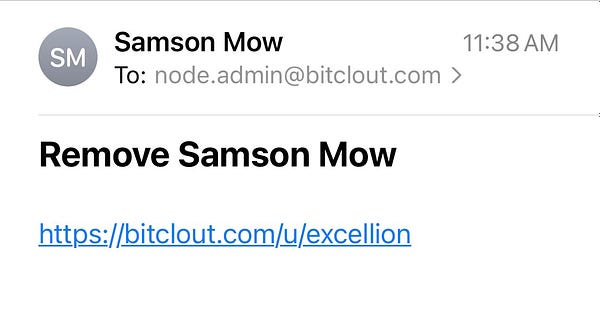
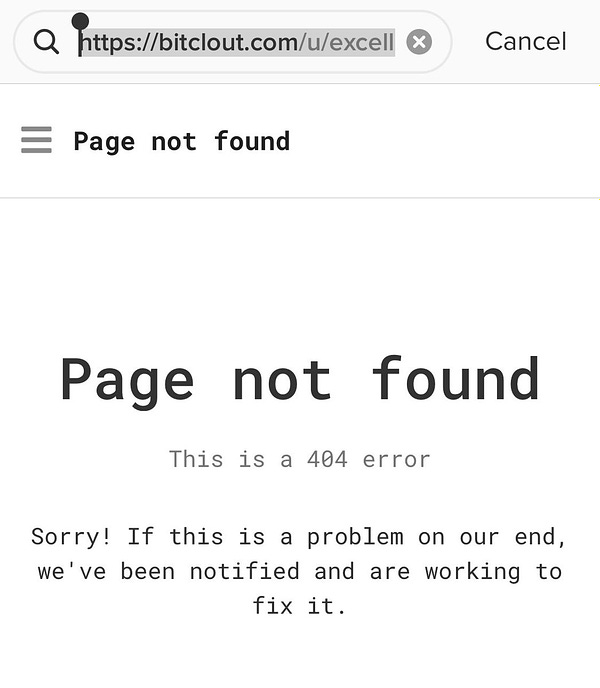
Sell your bitclout airdrop and buy Bitcoin.
How does one decide among these three strategies? By simply ignoring bitclout and holding Bitcoin, market forces are not engaged against bitclout. By requesting profile removal, the bitclout network reach is reduced, but the market cap of its token is hardly impacted at all. By selling the airdropped bitclout tokens and buying Bitcoin, the market cap of bitclout is actively decremented to the incremental benefit of Bitcoin’s market cap. It is this third approach that is most impactful: by selling bitclout for Bitcoin, you are actively devitalizing the bitclout ecosystem and enriching the Bitcoin network. Indeed, this is precisely how markets assimilate and disseminate knowledge. As a free market actor, it is incumbent upon you to express your preferences—to vote—through you buying and selling actions. Anything short of this, and you are indirectly upholding the market capitalization of a project you deem to be a scam.
Non-viable projects do not typically go away because people tweet about them. Their demise comes when there are more sellers than buyers for their equity and/or services. Free market actors act according to their theses—anything less is pointless.

Of course, the expression of an investment thesis cannot be considered outside the context of principles and morality…
Principles and Morality
Let’s consider an airdrop analogy: if someone dropped off a bag of slot machine tokens on your doorstep, would it be immoral to sell them? Even though you may not believe slot machines are moral, as they are designed to be addictive and wealth-extracting, there is still an active market for them. One could argue the most moral action would be to dispose of them, but this would just be a deflationary contribution to the issuing casino, assuming they had already sold these tokens for cash. Therefore, I would argue that the proper course of action would be express your thesis on slot machine tokens by exchanging them for Bitcoin—which is essentially a vote against the casino business model and a vote in favor of honest money.
Or consider the case of Bitcoin Cash: in late 2017, holders of Bitcoin were allocated Bitcoin Cash at a 1:1 ratio with their Bitcoin holdings. What was the proper course of action given a thesis in Bitcoin over Bitcoin Cash? This example perhaps makes it more obvious, the right thing to do morally and pragmatically was to sell what you’re short and buy what you’re long. By selling a shitcoin to buy Bitcoin, you are expressing your investment thesis by decapitalizing an inferior project and reallocating it into honest money. The bitclout trade is no different.
Did any of this contradict my principles of freedom, growth, or responsibility? All the exchanges that were made were voluntary, and I explicitly never endorsed bitclout, so there was no coercion or deception involved, leaving freedom untarnished. Growth was certainly derived from the entire experience (my ego took a heck of a bruising)—buying Bitcoin is positive for its growth, and the contribution to Bitcoin core development is a further boon to this principle. Finally, by sharing all of this in writing and creating a conscious division between myself and toxic maximalism, my responsibility to strive to influence the world positively is realized.
All things considered, I feel good about the outcome of this entire ordeal because I never once compromised my principles despite the storm I faced in the social media sphere.
By definition, the totalitarian believes his “knowledge to be total,” which leaves no room for discovery or humility. Is Bitcoin the only use case for distributed consensus? How can anyone claim to have the answer to that question, I certainly don’t know. My belief is that open-mindedness coupled with extreme vigilance in examining anything new is the best way to strike a balance between the supportive stasis of old knowledge and the revivifying dynamism of new discovery. Bitcoin maximalism, unfortunately, has reached a point where its toxicity now attacks inquiry into any “disapproved” topic—a cultural dynamic from which I am liberating myself.
Liberating Myself from Bitcoin Maximalism
As one of my friends messaged me:
“It’s amazing how many people are unwittingly smuggling their egos inside of “maxi toxicity” while convincing themselves they are selfless saints… I’m done with maximalists - same ol’ collectivism cloaking itself as sovereign individualism… I think there are many bitcoiners that are abusing the “toxicity is a feature” quote and are using it for status-power games on Twitter, which is petty and a zero-sum game.”
As Jordan Peterson says, “there is no way you can pay too much attention or exhibit too much humility.” How can anyone rightfully tell you where to place your attention? How can anyone honestly deride you for asking questions?
There’s an old saying: “believe half what you see and nothing what you hear.” First hand accounts are fallible, second order accounts are almost certainly fallacious. How many of the people on Twitter had determined first hand bitclout is a scam? What were the determinants? The dialectical process, in external conversation or internal consideration, is the work which uncovers truth. Anything suppressive to agency or dialectic is therefore generative to untruth. To the extent you recite a script or regurgitate the thoughts of others, you renounce sincerity and individuality.
As Jordan Peterson says, we outsource our sanity to those around us. If maxis call everything with a token a scam straightaway, without investigating, then groupthink and “madness of crowds” ensues. If each adheres to the principle of no condemnation prior to investigation, then the “wisdom of crowds”—the unparalleled distributed intelligence of the free market—can emerge.
Seeing maximalists rationalize my tweets was emotionally taxing but intellectually understandable when seen through the lens of ideological possession. I knew the truth about my words and deeds, but toxic maxis had interpreted a falsity fed to them by their own ideological filters.
Pathologized ideologies are characterized by certain words being deemed off limits. In this dominance game of tripwire laying, there are no right answers. Cross the mob and you’re called a scammer. “Scams” are difficult to surmise. Surely, not every “crypto” project is a scam, even if all other designs are ultimately determined to be non-viable. Of the thousands of projects out there, surely one is premised on honest intentions. The real question is: will anything built on distributed consensus succeed in the marketplace? What are the criteria for success?
Is Urbit a scam? Monero? Surely XRP is a scam? Are they all the same degree of scam? How do we measure them? The point of freedom maximalism is that the mind must be left free to learn through Bayesian inference, and cannot simply default to “it must be built on Bitcoin or else it is a scam.” Knowledge is static and limited, freedom of inquiry is dynamic and limitless. Although my thesis remains full consolidation at the base layer, with experimentation occurring at higher layers, this is by no means an immutable outlook, and my mind may change one day.
When the language is bastardized by calling everything that does not fit the party line a scam, and everyone that does not conform a scammer, the meaningfulness of language is lost. Like the little boy who cried wolf, noise overcomes signal, and effective communication is destroyed. In my opinion, breakdowns of meaning like this are the failures that cause the “madness of crowds.”
To maintain the integrity of human communication and coordination, language can never be ceded, because ideologies are wars of language. If everything that’s not Bitcoin is a “scam”, then inevitably there is no way to distinguish good from bad. And when those distinctions die, language dies, pulling justice and sound judgement into the grave with it.
Fostering Freedom Maximalism
Beware of false knowledge; it is more dangerous than ignorance…”—George Bernard Shaw
In my opinion, Bitcoin maximalism mistakes the means for the ends. For me, Bitcoin is a means to freedom—nothing more, nothing less. Anything that contradicts this highest principle—even under the auspices of “protection”—is a non-starter for me. Freedom matters more than Bitcoin.
Maintaining a balance between a stringent ideological filter and the humility to consider that other distributed consensus projects may find success in the marketplace is how I intend to represent my understanding of Bitcoin to the world. Instead of a doctrinaire focus on Bitcoin, freedom maximalism is built on a dogmatic adherence to principles. As the sole means of discovering truth, inquiry will never be discouraged.
Maybe the toxic approach is a better information delivery system for some, but it becomes counterproductive when it attacks inquiry itself. That’s what happened to me upon uttering the trigger word “bitclout,” and that’s why I decided to take a stand. As Bitcoin continues its evolution, I believe it will be of a greater benefit to outsiders to have a non-toxic alternative philosophy to toxic maximalism. Instead of commanding curious minds to “Have fun staying poor!” I will encourage the development of critical thinking, inquiry, and kinesthetic learning. Freedom maximalism is dogmatically non-doctrinaire, and therefore I believe it is a great alternative to the “totalizing knowledge” of overtly toxic Bitcoin maximalism.
Another way to look at it: Bitcoin maximalism “tells”—it is prescriptive in its solution (Bitcoin fixes everything) and proscriptive in its language regulation (1. don’t ever talk or think about shitcoins). On the other hand, freedom maximalism “asks”—what is the purpose of this project? What am I not seeing? Where might I be wrong? Telling is inherently propagandistic, since it involves advancing a static knowledge structure, whilst asking is poised with the intention of discovery, an invitation to interact with the dynamic unknown and learn something new. Freedom maximalism allows the devil’s advocate to speak, toxicity is a socially enforced gag order.
If more cryptoassets continue coming to market, everyone exploring this wave of innovation will eventually need to answer this question for themselves: what defines success for a cryptoasset project in the marketplace? This is not an easy question, I am not even sure which criteria to focus on yet. Perhaps, it is a sustained trading range above a $100B realized cap? For how long? But as the US dollar is further debased, it stands to reason that even this figure should be periodically revised upward? How often, and by how much? This $100B realized cap threshold is something Bitcoin has only crossed as recently as August 2019…
…and Ethereum is only 40% of the way towards achieving today:
In the face of the unknown, only inquiry can redeem us. I exalt the freedom of myself and others to express and test their preferences in the free market. I do not believe in communistic protectionism intended to insulate people from the consequences of their decisions: this anti-Darwinian reasoning is at the basis of “investor accreditation” laws in the US, which inhibits the truth finding function of free markets, and contributes to fiat wealth disparity. In Bitcoin, I intend to engage with and exchange ideas freely and earnestly in a spirit true to sovereignism, without regard for regulations or regulators of any sort. Freedom is “fuck you” to all attempted force.
Toxic maximalism now extends into an echo chamber camouflaging itself as morally superior concern for the dispossessed. Like critical race theory, which is ostensibly premised on the prevention of segregation but actually sows the seeds of its opposite, toxic maximalism that impinges on inquiry is inherently anti-freedom. By shutting down and distorting elements of language in its application, toxic maximalism that goes beyond preservation of the core protocol rules becomes a self-negating cultural dynamic. Those who refuse to comport with the toxic orthodoxy are ostracized: although this may be painful to the egos of the banished, I am betting that this “fork” can only be healthy for the ongoing cultural evolution of Bitcoin, and I am choosing to take the walk into exile valiantly.
Twitter blocking as an expression of freedom
Blocking is an expression of freedom, not censorship. One of the most rewarding experiences of this ordeal has been the opportunity to see true colors of certain toxic maxis, and to block accordingly. Frankly, as I was assaulted, I retaliated with a blocking rampage. My criteria was to block anyone that 1) made any demand of me whatsoever, or 2) said anything derogatory about me whatsoever. This ended up being a lot of people. Disengaging from small mindedness in this way seems to be an extremely healthy decision on my part, and other prominent Bitcoiners who have walked a similar path agreed with me in our private communications since.
Blocking is my choice. That said, in the recent flurry it is possible I went overboard on the blocks. If you want to be unblocked, you can DM me a request on telegram.
Conclusion
All counterarguments are subsumed by action. You might complain about the sun’s heat, but this won’t prevent your sunburn. You can whine about being poor, but this won’t improve your economic position. Action is the signal slicing through the noise of words. Irrefutably, my course of action was depletive to bitclout and accretive to Bitcoin. My decision was based on an investment thesis developed through my own critical thinking, not by blind faith in the opinions of others. The mutually voluntary exchanges that resulted were executed in a manner concordant with my principles of freedom, growth, and responsibility. For this, I am forever unapologetic.
Although toxic maximalism will likely always serve a purpose, Bitcoin is evolving beyond the putrefying culture that shepherded it through its younger years. It is my estimation that overt toxicity will continue to lose relevance as Bitcoin grows, and I support this change. Strict consensus on the core protocol rules, without agreement on broader cultural norms, is the detoxification of Bitcoin maximalism: a purification that I believe will flourish into the more vibrant culture of freedom maximalism over time.
Finally, thank you to all those you DM’d me love and support throughout this episode. Your words strengthened my resolve.
“You’re universally admired in bitcoin, which is why people are taking this opportunity to attack. Everyone wants to find a chink in the armor.”—A friend and well-known Bitcoiner, one of the kindest messages I received during this controversy
Subscribe to The Freedom Analects
Written works exploring truth, power, freedom, money, economics, virtue, sovereignty, philosophy, and other enigmas of existence.

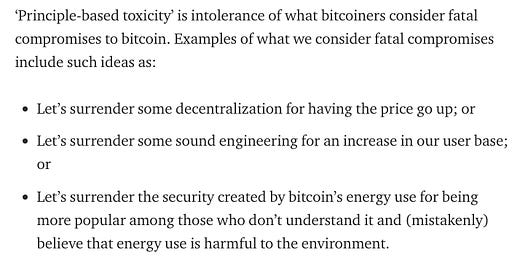




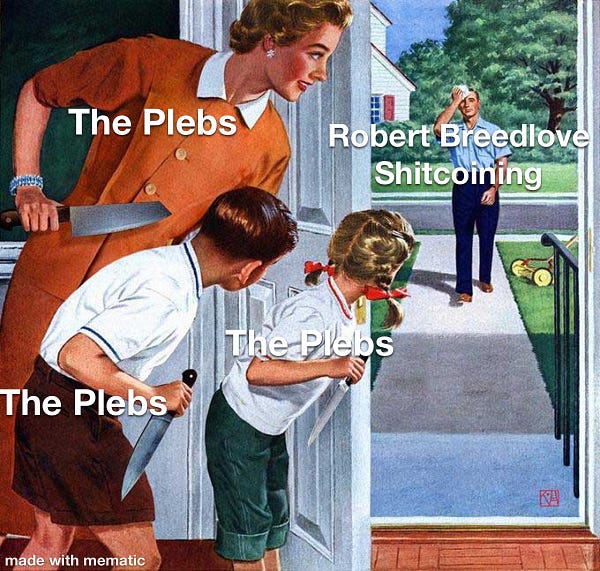



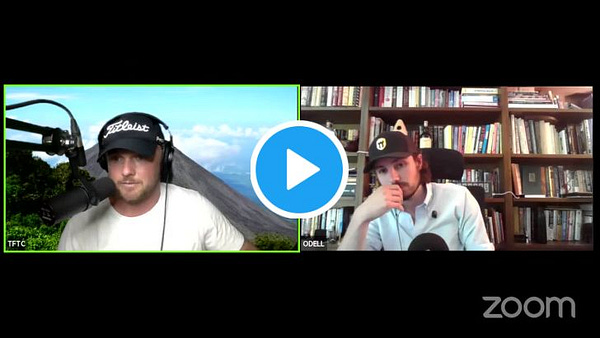


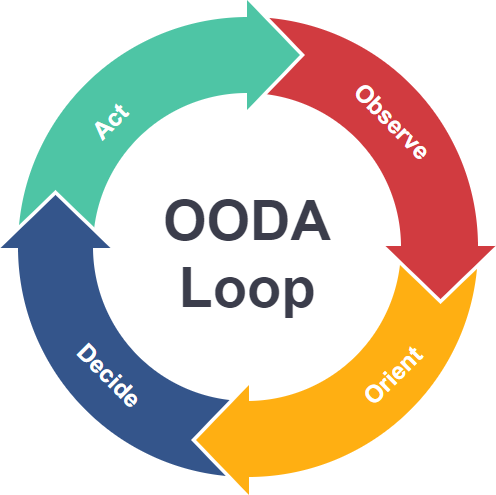

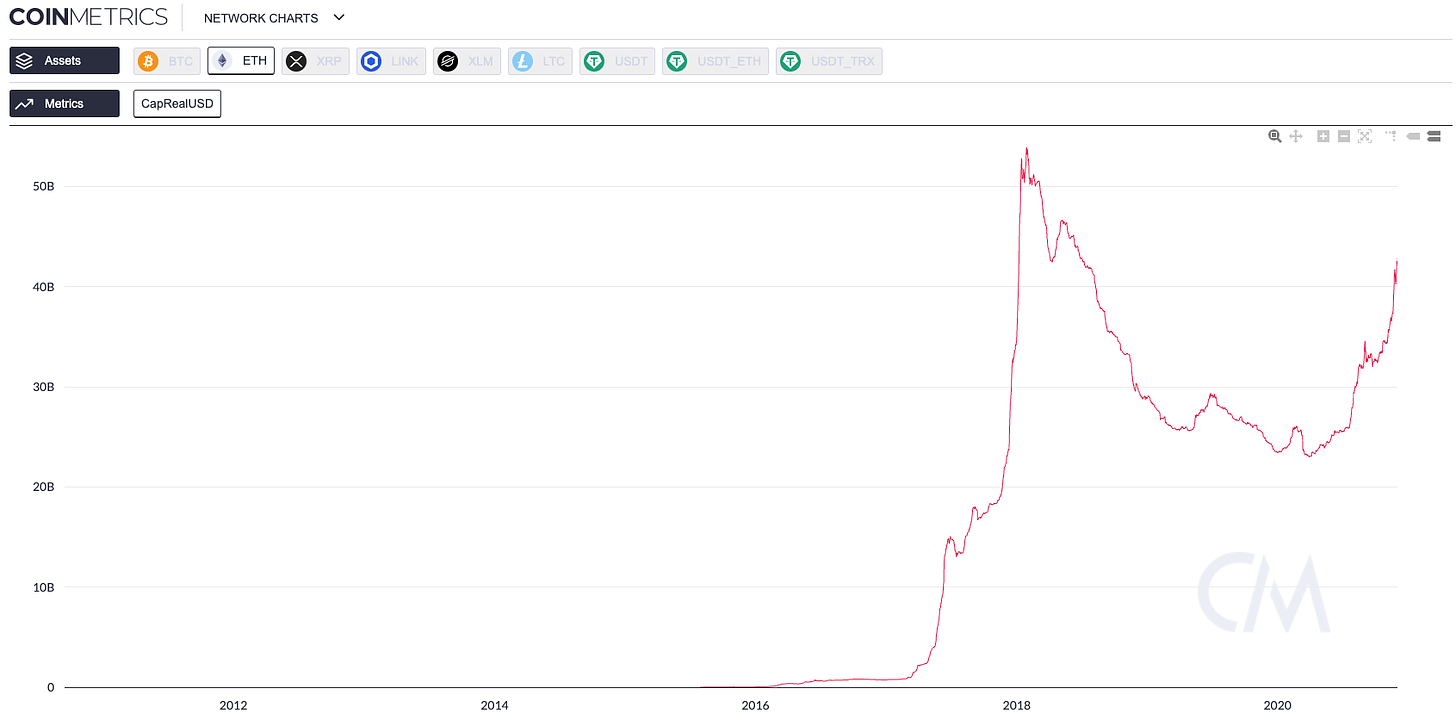











Absolutely no one faults you for selling your bitclout tokens for Bitcoin. Wow did you waste a lot of time accusing us of that! We all had BCH in 2017 so don't waste your breath!
Absolutely all maximalists fault you for CLAIMING the profile, because the process that bitclout made you go through to do so. They put in place a process which you agreed to go through, and knowingly did so. On this very page you admit:
"The trick here is that bitclout counts on this tweet to be an endorsement"
- And you then endorsed! Simple as that. You wanted the coins bad enough to endorse a shitcoin to your followers, and no amount of warning labels destroys that endorsement. That's the main reason. Stop blaming red herrings.
Something else you did here, in the beginning, that really ticked me off. You tweeted about a project, albeit neutrally, before you knew anything about it. Let's look at this act in some other industry, say, medicine. What if a doctor tweeted about a new prescription drug that the pharma reps are pushing on him but he didn't take the time to read 10 words about yet. How does your tweet look in that context:
"Would love to hear what my patients all think about ScamRx. I'll be taking a look at it over the next week - the first non-FDA approved drug I've looked at in a while. Here's my affiliate link to the drug's rep: BuyMyShittyDrugs.rx"
Sure, you warned them that it was an affiliate link and you haven't researched it yet, but you PUT THE LINK IN FRONT OF THE WORLD. You publicized their scam. The easily scammed could have a dozen different (bad) reasons to click on that link and you enabled that. Would they have without your help? No. Not while reading your tweet.
Face it Robert, you're a smart guy with a real gift for words, but you made a couple of bad decisions here. And no, I don't want you to "Bend your knee." I don't even know how you could do that in any useful way. All I can do is point out where you screwed up and hope you do better in the future, but sadly for you, it also means I won't listen to your -previously appreciated- writing/podcasts as often if at all. You've lost my trust & you're now exposed as a lessor thinker than I once had you pegged for.
Good luck on regaining that trust from your listeners, it won't be a quick process.
You seem to agree that "toxic maximalism" is a spectrum. You have called out the most toxic in this post but agree some level is vital for bitcoin to survive and fend off attacks.
So can you now address all the level headed maxis and at least give some sort of apology for your clear dishonesty? You were a hero to many and one of the most thought provoking speakers in the space and to lose an important figurehead at such a pivotal time kinda sucks and hurts many who held you in high regard.. hence the outrage.
To recap - what it looks like to many:
- You posted the initial link to profit for yourself - any other reason is disingenuous
- Disguised it as "research" (before even looking at it for yourself?)
- Got called out (obviously) and took it to heart
- Then tried to cover it up further, making it seem you think your audience is easily swayed
- Kept doubling down and being untruthful to your obvious original intent
- Now trying to establish damage control by donating it to core devs
- Wrote this whole article making out your intentions were always for the greater good - I doubt this from your earlier video admissions of thinking about buying shitcoin on the next cycle to dump on the uneducated noobs
- So many contradictions throughout this whole ordeal its hard to even process
You have let your ego and greed rule this completely and let it convince you that it's your free mind that's thinking. It's a true shame to see you go like this.
Please stop trying to convince yourself that you were doing a good thing in the name of research all along.
Yes we all like airdrops, easy money and forked coins but a person in your position should think carefully how public they are with their approach. Perhaps do the research for yourself first next time like I'm sure you do in 99.99% of your other studies.